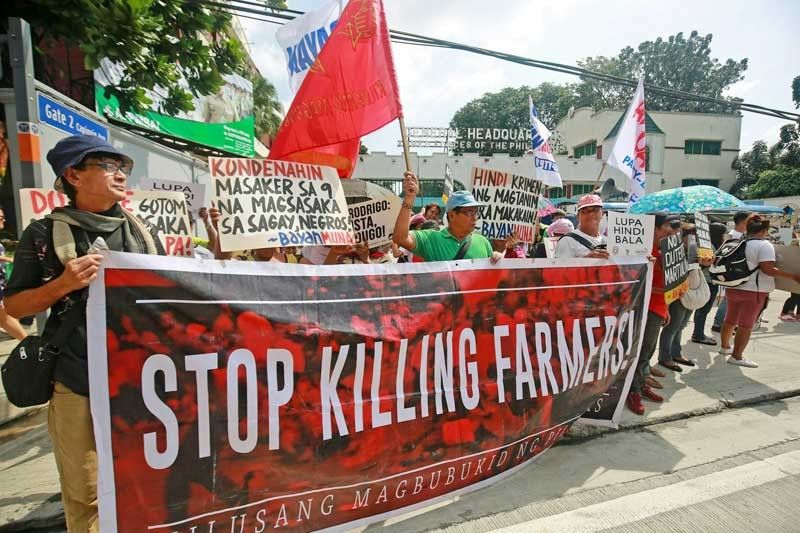CHR condemns killing of sugarcane workers

MANILA, Philippines — The Commission on Human Rights (CHR) condemned the killing of nine sugarcane farmworkers in Sagay City, Negros Occidental.
“It is most disturbing that death becomes the price of claiming one’s rights. This trend should not be allowed to continue anywhere and for any cause,” CHR spokesperson Jacqueline de Guia said in a statement issued yesterday.
“We call on the government to assure that justice will be served but, at the same time, address the plight of farmers with respect to agrarian reform,” De Guia added.
The CHR, through its Region 6 sub-office in Bacolod City, has sent a fact-finding team to probe the murders as it seeks to “ascertain accountabilities” in the killings.
Whitewash feared
The National Federation of Sugar Workers (NFSW) and Unyon ng mga Manggagawa sa Agrikultura (UMA) feared a whitewash in the investigation on the murders as they are holding the Duterte administration and the military accountable for the killing.
“The Duterte regime has no land reform program and not one of the more than 160 (extrajudicial killing of peasants) in the country has ever been resolved. Most if not all of these are due to land conflicts,” John Milton Lozande, UMA chairman, said yesterday.
Lozande called on the National Bureau of Investigation, CHR and civil society groups to be involved in the investigation.
For its part, the Kilusang Magbubukid ng Pilipinas (KMP) claimed that the victims were asleep in their bungkalan (farming site) when bullets rained on them.
“The bodies of (three victims) were also reportedly burned by the attackers,” KMP said.
KMP said it was waiting for updates from their quick-reaction team and fact-finding mission led by KMP Negros, Karapatan Negros and NFSW.
“Some of the victims and farmers launching the collective land cultivation activity or bungkalan are long-time sugar plantation workers in the hacienda,” KMP added.
KMP also cited a survey of Agrarian Reform Beneficiaries in the province a decade ago, showing that 41 percent of farm workers are no longer in possession of the lands awarded to them through the Comprehensive Agrarian Reform Program. NFSW estimates that this figure reached 70 percent as of 2018, KMP added.
On Aug. 28 to 30, thousands of hacienda farm workers held a camp-out in Bacolod City to mark the worst of tigkiriwi or tiempo muerto lean season.
On Sept. 20, farmworkers led by NFSW and multi-sectoral groups also marked the 33rd year of the Escalante Massacre during the Marcos regime, where 20 farm workers were killed by military and paramilitary forces.
Former Bayan Muna party-list representative Neri Colmenares also blamed government forces for the incident, claiming that the military had branded land cultivation areas as communal farms that support the Communist Party of the Philippines and New People’s Army (CPP-NPA).
Colmenares also accused the Duterte administration of “quelling any form of protest by criminalizing legitimate demands.”
For his part, opposition senatorial candidate Florin Hilbay yesterday condemned the killings.
“We condemn in the strongest possible terms the killing of nine members of the (NFSW),” Hilbay, a former solicitor general, said in a statement.
“The desire to obtain economic justice should not be paid back with violence,” he said in Filipino.
Hilbay, who is running under the Liberal Party in the May 2019 senatorial elections, urged the Duterte government to make those behind the murder of the workers accountable.
“The government must do everything to give justice to the death of the workers whose only desire was to own the land they till,” Hilbay said.
He feared that the PNP in Negros Occidental may be whitewashing its probe.
Meanwhile, the Rural Missionaries of the Philippines (RMP) yesterday asked for prayers and called for justice for the victims.
In a statement, RMP said that it is “one with the nation in calling for justice for the victims of the Hacienda Nene or the Sagay 9 Massacre. We enjoin all the religious to actively call for justice and pray for our slain brothers and sisters.”
RMP also appealed for the culture of violence and impunity to end in the country.
RMP attributed the dilemma experienced by some sugar workers to the semi-feudal society where “landlords are further empowered to monopolize lands and (enslave) the rural poor.”
It also complained that the government has been remiss in addressing the concerns of the peasants and worse, suppressed the rights of the people and “ultimately, spilling the blood of our brothers and sisters on the land they have been longing to cultivate as theirs.” – With Ding Cervantes, Helen Flores, Evelyn Macairan, Paolo Romero
- Latest
- Trending



























